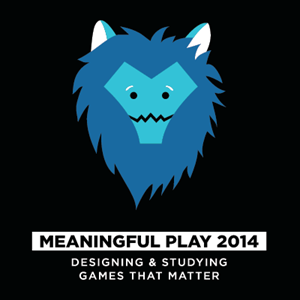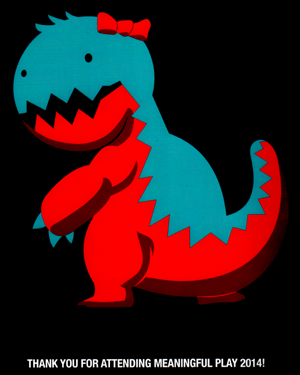Monthly Archives: October 2014
Meaningful Play 2014, Day 2
Meaningful Play 2014, Day 1
This academic conference on games gets underway in earnest.
The first day of  Meaningful Play 2014 started this morning with a keynote, continued with 3 conference sessions (6 choices each) followed by another keynote, and concluded with a special event where lots of games and research were presented in a social environment of happy, controlled chaos.
Meaningful Play 2014 started this morning with a keynote, continued with 3 conference sessions (6 choices each) followed by another keynote, and concluded with a special event where lots of games and research were presented in a social environment of happy, controlled chaos.
(There was actually “continental breakfast” available first thing, for those into waking up that early, but my schedule was not conducive to that.)
The proceedings were (briefly) opened by Johannes Bauer (Michigan State University), who chairs the Department of Media and Information at MSU, which department presented the conference. (Interestingly, I have known Johannes for about 20 years in a completely non-game context.) He introduced conference organizers, Brian Winn (Michigan State University), who I have known since before he started the first Meaningful Play, and Casey O’Donnell (Michigan State University). Casey spoke about the monsters theme as a metaphor for games and game studies, saying, “Monsters aren’t bad, only complicated.” Brian provided the selected hashtag, #MPlay and some (more grounded) conference numbers: 300 attendees from 17 countries and 23 US states.
The opening keynote was “Computer Game Studies: Moving Forward (?)“, presented by Mia Consalvo (Concordia University), who also had been one of the respondents last night. She structured her entire talk as a “Dear Espen” (a play on Dear Esther) letter replying to a 2001 commentary by Espen Aarseth. It helped set up the discussion on game studies, the primary focus of the conference, as well as subtly playing on the theme of diversity in games, which cannot help being an undertone of the discussion, given recent events. The talk was interesting and engaging but, if I am honest, not terribly enlightening, especially given that I have been a part of the game industry through the entirety of the history she covered and that the talk was targeted at researchers; the only time developers were really addressed was when she entreated us to all work together (i.e., for game developers to listen to scholars). My (retrospective) takeaway is that the area of “game studies” has to struggle for relevance within the larger industry.
For the first set of sessions, I attended a panel, “The Meaning of Casual: Serious Dialogues about Casual Games“, with presentations by Shira Chess (University of Georgia), Adrienne Shaw (Temple University), and Lauren Cruikshank (University of New Brunswick), with a remote from Maria Cipollone (UX researcher at Zynga). The panel was (ostensibly) about taking casual games seriously, which I found really intriguing, but there was a large overlap in the genres discussed, completely excluding the types of casual games that my company builds. Specific points made about nurturing games targeted at young girls do not translate to casual games in general, and where puzzle games or solitaire were mentioned, there seemed (to me) to be a bit of the same air of derision that the panelists were supposedly denouncing. (I was astounded, too, that discussion of nurturing games never once mentioned the word, “tomagotchi”.) The remote presentation was the most interesting, but the conclusion was one that we already know well, specifically, that “casual gamers” can be anything but casual about playing.
That panel provided a basis for some interesting observations, however. The first two presenters (at least) have been called out by name in the #GamerGate controversy, which I suspect is the reason that the group seemed to be a little bit insular. Whenever I saw one of them throughout the day, the others were always there. (This is in contrast to my own conference behavior, where I often eschew friends in order to make new acquaintances by talking to other people.) On that (parenthetical) note, one of my new conference friends went to the workshop, “Make the Course You Want to Take: MSU’s Surviving the Coming Zombie Apocalypse” and she (an educator) raved about how good that session was.
Then, there were two more sessions in the afternoon. [OK, I admit it: I went home for a few hours, as I was not fully prepared to exhibit tomorrow, and I was also yawning due to “jet lag”, my normal schedule being closer to Pacific Time. 🙂 ]
The afternoon keynote was “Meaningful Leverage: Breaking the System of Ignorance“, presented by Erin Hoffman (Game Design Lead at GlassLab), who is probably best known as being “ea_spouse“, from the exposé on labor practices at Electronic Arts. This keynote was quite enlightening, and well-presented. Hoffman began by discussing the concept of systems as known to game developers, with references to game balancing, noting how easy it is (or can be) to “break” a system, which in the context of game design is a Bad Thing. She then turned the topic on its head, looking at the larger world, making the case that ignorance itself is a system that feeds upon itself, and asking how we could work to break that system (improving education and fighting poverty being two obvious approaches), which would be a Good Thing. This a fascinating concept, provoking thought and discussion, and seemed to be very well-received among attendees.
One point I found interesting, albeit mostly unrelated to the keynote itself, was when Hoffman dismissed casual games as “meaningless”. I happened to be directly behind the table occupied by the presenters from the earlier panel on casual games, in a line of sight to the speaker, and it seemed that the whole table had a visceral reaction of discomfort at the statement. The sentiment (or flinching) must have been somewhat broader, because the speaker immediately attempted to clarify her intent. However, I do not think that she helped her case any by stating that did not mean they were unimportant, because they must provide something that is otherwise missing in the lives of casual game players. Wisely, she quickly moved on before digging that hole any deeper; so shall I. 🙂
After a dinner break, there was the Special Event: Conference Reception, Game Exhibition, and Poster Session. The main event was held in the ballroom, with the posters (and open bar) just outside. Alas, some of the scheduled posters were not there (and few of the authors), but fortunately, Allen Trammell was there to discuss his most interesting one, Vertiginous Play: Debating “Fun” with the Diplomacy Wives Club, in which he looked into archives of the fan community of Diplomacy (a board game) from the 1960s and found parallels to current debates within the video game community. After a healthy discussion there, I attempted to introduce myself to the aforementioned casual games micro-group to share my thoughts, was rudely rebuffed (an action rife with opportunities for speculation), and then bumped into Brian Winn, for the first time since his conference started, and had a (no doubt) much more fulfilling conversation with him.
Inside the ballroom, there was all manner of activity, with lots of games, both digital and “analog”, being discussed, demonstrated, and played. There was bustle everywhere, and the event seemed to be really successful. Some of the digital games that I saw were Fat Chicken, though Josh Mills was struggling with the seemingly inevitable technical issues when I visited, After the Storm, an interesting educational game for reading and writing in the context of journalism, and Guided Meditation, which was my first direct experience with the Oculus Rift headset (and my first VR headset experience in probably 10 years). On the board and card game side, after meeting Clay Ewing, I made a point of checking out both Humans vs. Mosquitos and Vanity, the former (in particular) being impressive in its ability to convey a message in the context of an elegant card game that would be welcome at one of our regular game nights.
I also came across the game, The Bone Wars, a game about paleontology in a (narrow) historical context that taught me something with just the description. What made this most interesting for me, though, was that I got involved in a discussion with the project advisor, Paul Gestwicki (Ball State University), in which we were able to discuss technical aspects of game development in depth. We talked about tools, and game engines, and the difficulties inherent in creating general Solitaire deal solvers, and all manner of other topics of interest to programmers. The conversation lasted until the event had technically ended and the ballroom was starting to empty.
Returning to my office at the end of a long day, I am looking forward to more to come. (I also realize that I parked downtown three different times, in three different cars…)
Meaningful Play 2014, Day 0
A special talk prepares attendees for the conference itself.
 Tonight, prior to the official Meaningful Play 2014 opening, there was a pre-conference Quello Center Lecture Series talk entitled, Racism, Sexism, and Video Games: Social Justice Campaigns and the Struggle for Gamer Identity.
Tonight, prior to the official Meaningful Play 2014 opening, there was a pre-conference Quello Center Lecture Series talk entitled, Racism, Sexism, and Video Games: Social Justice Campaigns and the Struggle for Gamer Identity.
The main presentation was given by Lisa Nakamura (University of Michigan), with respondents Rabidra Ratan (Michigan State University) and Mia Consalvo (Concordia University).
I found the talk quite interesting and informative, and incredibly timely, though there was not much that was actionable The respondents generally agreed with the premise, merely stating a different perspective. All of the speakers referred to “stereotype threat“, which (oversimplified) is the tendency for individuals to exhibit negative traits ascribed to groups to which they belong when confronted (subconsciously) with the stereotypes. One example given was that a purple alien in the midst of many green aliens would tend to behave in a manner attributed to purple aliens generally. Answering a question, Ratan extended the idea to suggest that this manifests not only within an individual online game, but also in the selection of games played, which provoked a response from an audience member that is probably best described as “vehement (eventual) agreement”. 🙂
At a result of this exchange, I found myself considering the programming team that I (originally) led at Spectrum HoloByte. I was hired as Senior Software Engineer, and Lead Programmer on Star Trek: The Next Generation, “A Final Unity”, which was developed by an internal division called the “PC Group”. The other big group was the “Sim Group”, which programmed military simulations, namely the Falcon aircraft simulators. Our PC Group had been responsible for the line of Tetris games for MS-DOS, while the Sim Group had just finished shipping Falcon 3.0, which by internal accounts (verified by documentation) had been one of the worst death march situations in the industry.
My initial team was five programmers, including myself, but what makes it interesting is that the team was 60% female (back in 1993). I was, of course, one of the two male programmers, and I had been considered for 3 positions, but in the interview process I made it clear that I was not interested in flight simulators and did not wish to be considered for the Sim Group opening (though the producer insisted that we talk anyway). The other male programmer had been integral in the Sim Group for the previous product but, for his own reasons (n.b., “death march”), had chosen to switch groups. On the other side of the building, the Sim Group had exactly zero female programmers.
I have always thought that this arrangement was interesting, but in the context of the talk, it provides some anecdotal evidence that not only is there some gender bias in games played but, to the degree allowed by business, this is also true of games being developed. In other words, three female programmers gravitated to the group creating puzzle, board, and arcade games, while two male programmers moved away from the war games. For the record, this was one of the best teams, in terms of atmosphere, I have experienced (until “circumstances” intervened, as they eventually must).
A Note about #GamerGate
This talk took place just one day after the story broke about Anita Sarkeesian receiving terrorist death threats and having to cancel her talk at Utah State University, so despite having been scheduled for months, the topic was almost disturbingly topical. Aside from an offhand joke on Twitter (below), I had not been following or involved in the #GamerGate controversy, so I was interested to learn that several of the players in the “social justice warrior” (not a pejorative) space were to be speaking at Meaningful Play 2014 (again, having been scheduled many months before the storm even began). This really sets an underlying theme for the rest of the conference.
I think #GamerGate is what happens when people read the comments. 🙂
— Gregg Seelhoff (@GreggSeelhoff) September 17, 2014
My personal take on the controversy is that it is disappointing that there are “sides” and each faction is trying to somehow “win”, despite there being no achievable victory conditions. At an academic conference, and especially within the audience for this talk, there is unlikely to be any sympathy with those who make threats, but it is not merely the ignorant who are stirring the pot. As somebody who is not innately a member of any disadvantaged minority group (except “genius” 🙂 ), I still appreciate (and actively support) the push for diversity in the game industry, but cannot support rhetoric which serves to divide and/or supports deliberate disruption of the field in which I have made my career.
So… New Cooperative Game Rules:
- Live and let live.
- Stop talking; start doing.
- If you say “them”, you lose.
- You do not win when others lose.
- Objectives:
- more games
- more diversity
- more choices
- more prosperity
I am happy with a collaborative effort, so please feel to contribute rule suggestions.
Meaningful Play 2014
This is the International Academic Conference on Meaningful Play.
 This week, Michigan State University hosts Meaningful Play 2014, the fourth edition of this bi-annual academic conference discussing “games that matter“.
This week, Michigan State University hosts Meaningful Play 2014, the fourth edition of this bi-annual academic conference discussing “games that matter“.
Meaningful Play 2014, running October 16-18, 2014 in East Lansing, Michigan, includes numerous keynotes, speakers, panels, roundtables, workshops, papers, and special events, all examining and promoting the idea that games can (and should) have a positive impact.
This year, SophSoft, Incorporated is not only attending the conference but, for the first time, we are sponsoring Meaningful Play. In addition to sponsoring, we will be exhibiting our games (as Digital Gamecraft) in the Pure Michigan Game Exhibition and Celebration, giving away free copies of Demolish! Pairs, and I will be participating in a panel, Growing the Game Industry in Michigan: 2014 Update.
I have attended Meaningful Play two (of three) previous times, in 2008 and 2010 (missing 2012 only due a scheduling conflict), and I found them to be quite refreshing. Like other conferences I have attended, I leave filled with inspiration, but as an academic conference, this one also challenges me with many new ideas about games, with scientific studies, unique approaches, and non-commercial products not seen at major industry events.
Over the new few days, I intend to document my experiences and takeaways from Meaningful Play 2014, for which I will link below as articles are published:
- Meaningful Play 2014, Day 0
- Meaningful Play 2014, Day 1
- Meaningful Play 2014, Day 2
- Meaningful Play 2014, Conclusion
Pretty Good Solitaire Mac Edition 3.02
We finally finished this extensive technical update.
 Pretty Good Solitaire Mac Edition 3.0 has now been released by Goodsol Development. It is available for immediate download/purchase for only $24.95, and a trial version is also available.
Pretty Good Solitaire Mac Edition 3.0 has now been released by Goodsol Development. It is available for immediate download/purchase for only $24.95, and a trial version is also available.
This version of Pretty Good Solitaire Mac Edition contains 550 games (50 more than the previous version), and the full version provides access to another 75 bonus games. The interface also contains many user interface improvements.
From a technical perspective, this is a major upgrade, as it represents a complete conversion of the program from Carbon libraries (used since version 1.0) to Cocoa frameworks, an effort imposed by Apple’s diminishing support for the former. In the process, numerous features were reconsidered and reimplemented, so there are various improvements throughout the program. One thing that we lost in the process was support for (much) older versions of Mac OS X; the current version requires Snow Leopard (10.6).
What happened to 3.00 and 3.01?
As is often the case with major technical changes, there were a couple of teething problems. In the first release (3.00), we discovered a race problem with the Cocoa system, where 5-10% of our users had systems that were sending messages to objects that had already been disposed, causing the program to crash when run on these systems. (Of course, none of the test systems exhibited this problem.)
The second release (3.01), as well as the first, was discovered to have a critical error with menu handling, namely, that card sets could not be switched (properly) using the ‘Preferences->Card Set’ menu. Unlike the first issue, this one was always reproducible, missed entirely by our testers, and completely my fault. Oops… 🙂
Once the current version proves stable, we will be adding quite a few (probably 25) more new games and making more interface improvements, including the most requested feature, an ability to sort results and high score tables. This, of course, will be a free upgrade for all then current PGSME customers, so buy now!


